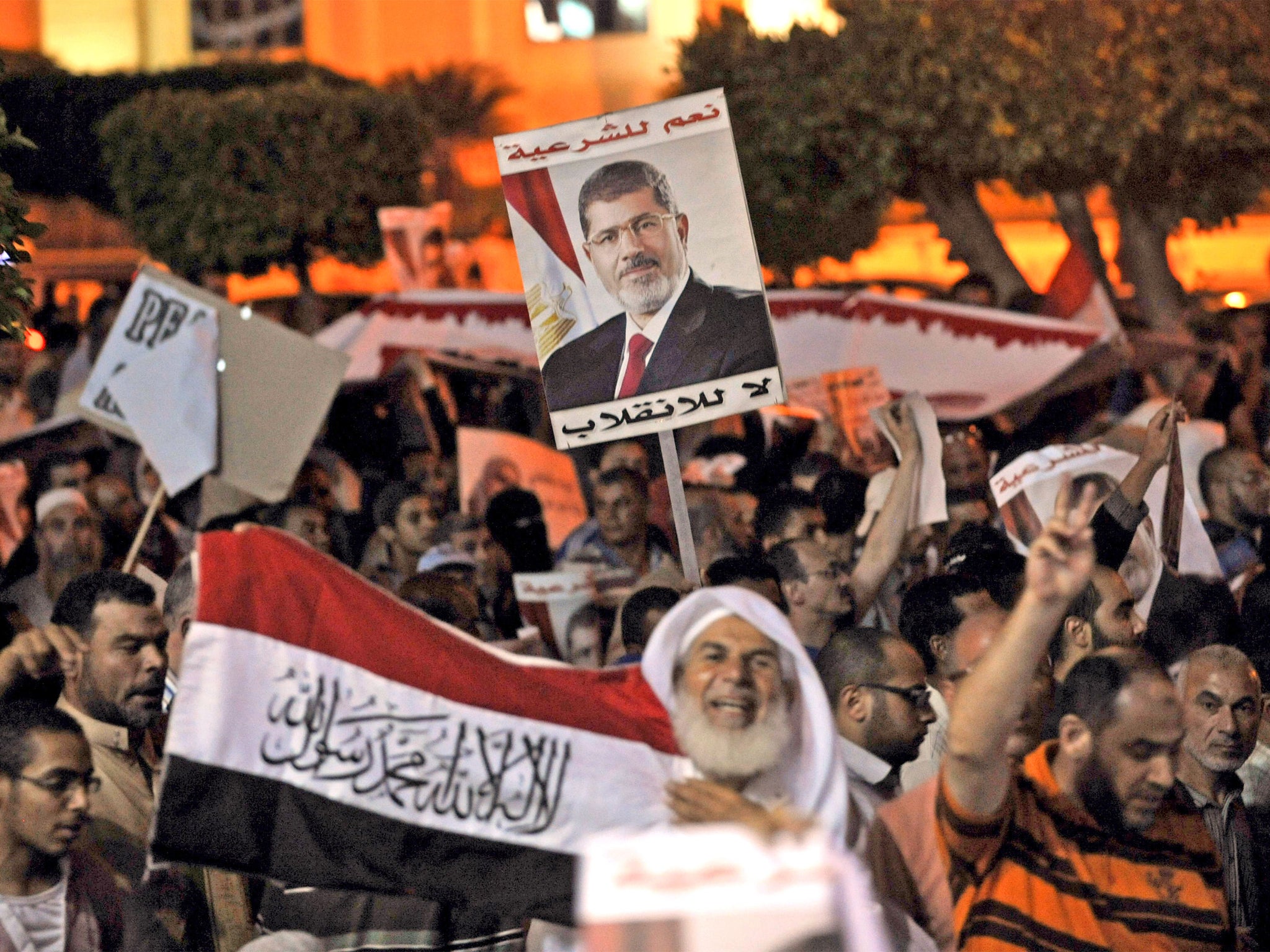Egypt unrest: Leaders plan strike against Muslim Brotherhood as Cairo protest branded threat to national security
Almost 300 people have been killed in weeks of violence since the army deposed the former president

Your support helps us to tell the story
From reproductive rights to climate change to Big Tech, The Independent is on the ground when the story is developing. Whether it's investigating the financials of Elon Musk's pro-Trump PAC or producing our latest documentary, 'The A Word', which shines a light on the American women fighting for reproductive rights, we know how important it is to parse out the facts from the messaging.
At such a critical moment in US history, we need reporters on the ground. Your donation allows us to keep sending journalists to speak to both sides of the story.
The Independent is trusted by Americans across the entire political spectrum. And unlike many other quality news outlets, we choose not to lock Americans out of our reporting and analysis with paywalls. We believe quality journalism should be available to everyone, paid for by those who can afford it.
Your support makes all the difference.Egyptian authorities gave the strongest indication yet that security forces were preparing a strike against the Muslim Brotherhood - announcing in a televised statement that the group's month-long Cairo sit-in was a threat to 'national security' and would soon be ended.
The statement, which was issued by the country's interim cabinet, prompted fears that of another deadly confrontation between authorities and Muslim Brotherhood supporters.
The move against the sit-in protest came as it emerged that Egypt's prosecutors have referred three of the Brotherhood's most senior figures for trial.
They include the group's revered Supreme Guide, Mohamed Badie, along with his deputy Khairat al-Shater and senior leader Rashad Bayoumi. All three are wanted for charges related to inciting violence.
At least 300 people have been killed in nationwide clashes since the June 30 - the date the former president Mohamed Morsi was toppled by an army-led coup. The dead include scores of Islamists who have been gunned down during two separate massacres within the space of three weeks - more than 80 of whom were killed on Sunday when police tried to disperse the sit-in at Rabaa.
The developments raised fears that an anti-Islamist crackdown - which has been anticipated by many since an ominous speech by General Abdel Fattah al-Sisi, Egypt's top military commander public face of the coup, last week - is now imminent.
During its televised address, the interim cabinet said that “terrorist acts” and continued traffic disruption were no longer acceptable and “represent a threat to Egyptian national security”.
It added: “The cabinet decided to begin taking all necessary measures to address these dangers and put an end to them, commissioning the interior minister to do all that is necessary regarding this matter within the framework of the constitution and the law.”
Since the first day of the June 30 revolt, tens of thousands of Mr Morsi's supporters have been maintaining a vigil from two giant tent encampments in separate parts of the city.
The largest, in the suburb of Nasr City in eastern Cairo, has often been filled with tens of thousands of people.
The vast majority of them appear adamant that they will not leave the streets until Mohamed Morsi is reinstated as President - an impossible demand for the Brotherhood's opponents to recognise. Any attempt to clear so many protesters by force would turn into a bloodbath.
This evening [WED] Gehad el-Haddad, a spokesman for the Brotherhood, remained resolute in his assurance that Mr Morsi's supporters would not melt away. “We don't recognise this government and we don't recognise the authorities or the laws they represent,” he told Reuters.
Speaking to The Independent, a pro-Morsi activist said he was not afraid of the impending crackdown. “How much worse can it get?” asked Mohamed Soltan, referring to the two massacres which took place this month. “The government doesn't understand that blood is the fuel and fire of revolutions.”
Egypt has become dangerously polarised over the course of the past month. Many people - spurred on by a resolutely anti-Brotherhood media - have begun to think of the Islamists camped in Nasr City as little more than a gang of would-be militants.
Statements from the military and television presenters have roused a collective fear of the national “terrorist” threat - conflating a genuine problem of Islamic militancy in North Sinai with scaremongering aimed at followers of Mohamed Morsi.
“The pro-Morsi protest is not a sit-in,” said Haitham al-Shawaf, a member of a youth revolutionary group. “The people there are not protesters, they are militants.”
In a bid to counter the increasingly trenchant rhetoric emerging from both sides, a group calling itself the Third Square movement has occupied yet another plaza in eastern Cairo with a view to rejecting both the influence of the military and the Muslim Brotherhood.
Yet in a sign of how little traction is being gained by appeals to moderation, the campaign has already earned the opprobrium of Tamarod, the youth movement which spearheaded the June 30 revolt.
The group's spokesman, Mohamed Abdul Aziz, said Third Square was “dividing the people”, adding: “They are living in the past. Now is the time for consensus, we need to move forward.”
Join our commenting forum
Join thought-provoking conversations, follow other Independent readers and see their replies
Comments